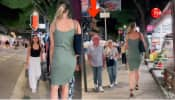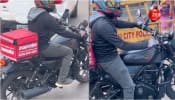Mumbai: A slight figure in cargo pants and sneakers and a blue sweatshirt, gun-wielding Ajmal Kasab was the face of the horrific Mumbai terror attack and the key to unravel the conspiracy hatched in Pakistan.
The images of Kasab ambling cockily -- a backpack on his shoulders and an AK-47 dangling carelessly -- captured on camera at the Chhatrapati Shivaji Terminus (CST) on the deadly night of November 26, 2008 formed hard evidence of his ruthless act and eventually led to his conviction.
Kasab, 21 at that time, was the only gunman caught alive after 10 men from Pakistan-based terror group Lashkar-e-Toiba (LeT) struck during a 60-hour-siege of the country`s financial capital.
Hailing from an impoverished Faridkot village in Okara district in Pakistan`s Punjab province, Kasab many times during the legal proceedings described himself as a patriotic Pakistani and that he had no remorse for waging war against India. His father was a food vendor.
"I have done right, I have no regrets," he is quoted as having said.
He, however, pleaded leniency on purported ground that he was brainwashed by LeT and acted like a robot.
Kasab came under the influence of LeT while he was an unemployed youth and after training in one of several remote camps in Pakistan he was hand-picked for the Mumbai operation.
In a meticulously planned terror attack on November 26, 2008, Kasab and nine others left Pakistan and entered Mumbai via sea.
The group split into pairs and stormed two luxury hotels -- Taj Mahal and Oberoi Trident -- CST station, a Jewish religious centre, and Leopold Cafe in South Mumbai. In their indiscriminate firing, 166 people including 18 foreigners were killed and scores injured.
While it is reported that he told the police that he was trained to "kill to the last breath when he was arrested, he pleaded with the medical staff: "I do not want to die. Put me on saline".
Later, after interrogation in the hospital by the police, he said: "Now, I do not want to live", requesting the interrogators to kill him for the safety of his family in Pakistan who could be killed or tortured for his surrender to Indian police.
Kasab is also reported to have told the police that he and his associate Ismail Khan, were the ones who shot Anti-Terror Squad (ATS) chief Hemant Karkare, encounter specialist Vijay Salaskar and Additional Commissioner Ashok Kamte.
Judge M L Tahaliyani, who conducted the Mumbai attack trial, said "he (Kasab) should be hanged by the neck until he is dead", adding that he had lost his right to "humanitarian treatment".
Kasab had left his home in Pakistan after a fight with his father in 2005.
He had asked for new clothes on Eid, but his father could not provide them, which made him angry. He then became involved in petty crime with his friend Muzaffar Lal Khan, and soon moving on to armed robbery.
On the day of Eid on December 21, 2007, they were in Rawalpindi trying to buy weapons when they encountered members of JuD, the political wing of LeT, distributing pamphlets. After a brief chat, they decided to sign up for training with the LeT ending up at their base camp, Markaz Taiba.
Kasab was reported to be among a group of 24 men who received training in marine warfare in mountainous Pakistan-occupied Kashmir (PoK). The group was later shortlisted to 10 that included Kasab.
Zaki-ur-Rehman Lakhvi, a senior commander of LeT, reportedly offered to pay his family Rs 150,000 for his participation in the attack.
Villagers of Okara claimed on camera that he was at their village six months before the Mumbai attack. They said that he asked his mother to bless him as he was going for Jihad, and claimed that he demonstrated his wrestling skills to a few village boys that day.
Initial reports offered a conflicting view of Kasab as fluent in English, and from a middle class background. However, an interrogator and deputy commissioner of the Mumbai Police stated that he spoke rough Hindi and barely any English.
Kasab was found guilty of 80 offences, including waging war against the nation, which is punishable by the death penalty.
His death sentence was upheld by the Bombay High Court on February 21, 2011. The verdict was upheld by the Supreme Court of India on August 29 2012.
PTI















